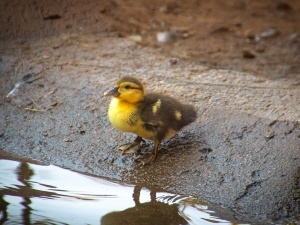
All offspring need the protection of their parents if they want to survive the harshness of the wild or even learn how to live as adults, ducklings included.
But how do mother ducks protect their young? This article looks into it.
Table of Contents
How do mother ducks protect their young?
The term sitting duck describes someone who has no protection from dangers around them, however, ducks have lived for years and have survived to raise their young, so how do they do this?
This article looks into how mother ducks protect their young.
Sitting on her eggs:
The first way that a mother duck will protect her young is by sitting on her eggs and guarding them until they hatch, this is called brooding.
A mother duck will incubate her eggs, sit on them all day, and she will only leave the eggs when she needs to go eat, stretch her legs, and swim in a water body.
She will swim in a water body to get herself wet and then come back to sit on her eggs to keep them humid.
The eggs will be protected from the cold under the mother who will maintain the perfect temperature for the ducklings in the eggs to grow in.
She will also snuggle up to the ducklings after they’ve hatched to make sure that they are kept warm as their fuzzy down doesn’t keep them warm enough.
Mothers supervision:
Once the ducklings hatch they will stay with their mother who will keep the birds protected by avoiding danger.
She will lead them to safe places to feed, forage and swim. This keeps them in safe areas away from predators.
These baby birds are most vulnerable when they are 1 1/2 to 2 months old so the mother duck will be very protective of them during this time.
She may also try to camouflage herself and her young to keep them safe from predators.
Keeping them safe from poisonous foods:
Not only do mother ducks protect the babies from predators in the wild, she also protects them from unsafe foods.
The ducklings will be attached to the mother from birth and they will follow her around and do what she does.
She will go around eating food and they will eat what she eats and learn to not eat what she doesn’t eat ie: poisonous foods.
The ducklings will not try any foods that their mother has not already eaten.
Supervised introductions:
Older ducks, especially older male ducks, don’t take too kindly to new ducks entering the flock. The mother duck will go off and hatch her ducklings in isolation and have to introduce her ducklings to the flock.
She will keep them safe by supervising them once they are introduced into the flock and will protect them if other ducks start to pester her ducklings.
She also protects them by only introducing the baby ducks when they are at least 7-8 weeks old or at least partially feathered.
Scare off threats:
If there is a threat close by then the mother duck will definitely act in order to protect her offspring. She will make loud noises at the threat as a way of trying to scare the threat off.
If this doesn’t work she may even run toward the threat while also making loud noises to scare the threat off.
If you enjoyed this article then you may also be interested in other bird related articles. Here are some articles that you may be interested in: Do Ducks Love Their Babies?, Duck Biting Other Ducks Neck, Can You Train A Duck To Attack?, How To Care For A Single Duckling, How Do Ducks Know Their Babies?, Abnormal Duck Behavior, Why Is My Duck Making Weird Noises

